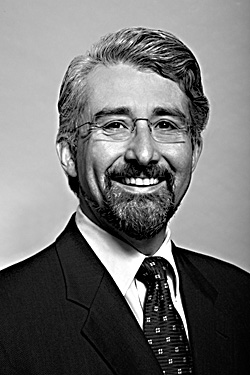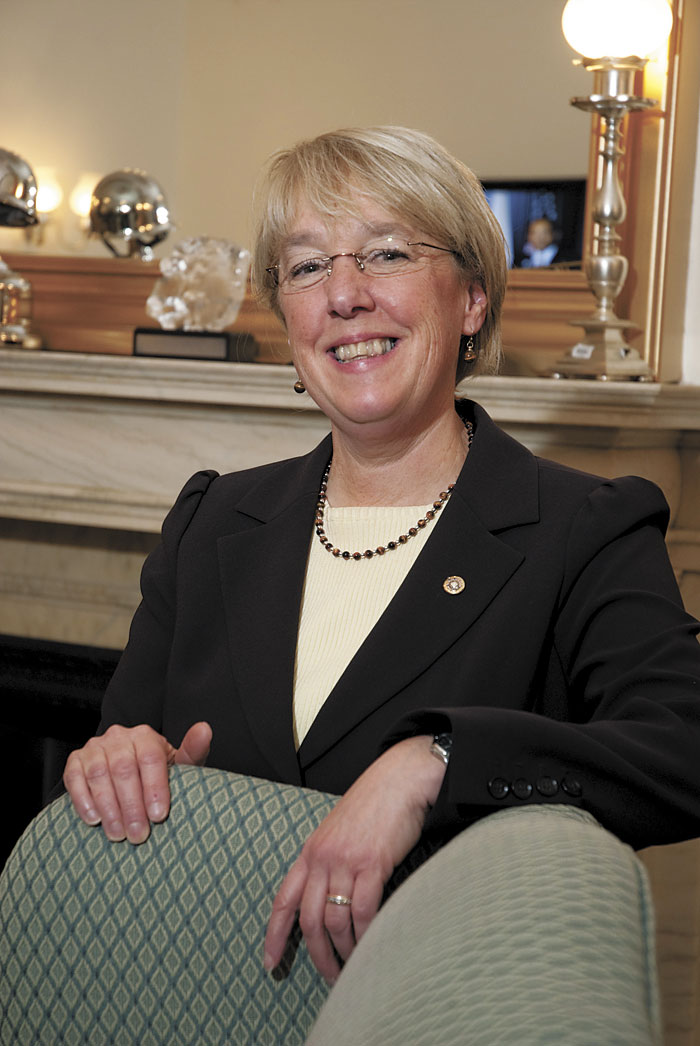Seattle Port Commission candidate Bill Bryant may be a businessman with Republican leanings, but his angle on the race is all about the environment. His logo is an orca swimming under his name on a background of brilliant blue, and his Web site features the usually suit-and-tied Bryant in a long-sleeved white T-shirt that carries the slogan of a local nonprofit dedicated to salmon restoration: “Long Live the Kings.”
Bryant, who founded a consulting firm that helps companies export their products, puts cleaning up Puget Sound as No. 1 on his advertised list of priorities. He’s pitched a plan to create something called the Port River City Forum that would bring mayors from Seattle, Tacoma, and Everett together to develop restoration projects for rivers, like the Duwamish in Seattle, that empty into the bays the ports inhabit. If elected, Bryant says he’ll bring a history of working on watershed restoration to the Port Commission. He cites his efforts helping to found the Nisqually River Foundation and helping craft its 50-year plan to preserve animal and plant habitat and encourage sustainable development.
But the environmental king-makers didn’t bite. While Bryant’s Web site describes him as a “supporter” of Washington Conservation Voters, that group has not returned the favor. Nor has the Sierra Club. Both opted to endorse incumbent Alec Fisken, a decision they say was a no-brainer.
For starters, says Scott Otterson, political chairman of the Sierra Club’s Cascade Chapter, Bryant didn’t take the time to meet with them. “The fact that he wasn’t able to set up an appointment with us, it makes you wonder,” he says. (Bryant says he tried.)
Plus, Otterson says, Fisken (elected to commission Position 5 in 2003) has been a champ on their issues, such as reducing ship emissions, pushing for better air quality at the airport, and cleaning up the Duwamish. “He’s advocated for much stronger standards than what’s existing now,” says Otterson. “He’s on it. He’s been on it for a long time.”
“There’s no question whatsoever with respect to [Fisken’s] commitment to the environment,” says Kurt Fritts, executive director of Washington Conservation Voters. “He’s focused his attention on clean air and clean water and has done so in a way that doesn’t hurt the economic viability of the Port.” (In August, Washington Conservation Voters donated $2,800 to Fisken’s campaign.)
Bryant’s struggles point out a local divide between the lefty greens and the more business-friendly Gold Coast wing of Northwest environmentalism. Orca and save-the-salmon T-shirt aside, Bryant’s association becomes apparent when you click on the list of “environmental leaders supporting Bill” on the campaign Web site. The names include former Environmental Protection Agency Administrator William Ruckelshaus, lawyer (and son of Congressman Norm Dicks) David Dicks, and Doug Walker, former CEO of software giant WRQ (now owned by Attachmate).
Walker, now REI board chairman, notes that Bryant is on the board of Stewardship Partners, a group that encourages private landowners to restore natural areas, but do it in a way that still meets their economic needs. “He takes a Nature Conservancy–type approach,” Walker says. “It would be less likely to find Bill on the Greenpeace board….He’s got an environmental bent, but also has a lot of business experience. I like that.”
When talking environment, Bryant often speaks in terms of building consensus (code for involving business interests). “The Nisqually River plan will be successful because we brought everyone together,” Bryant says. “All of the great environmental successes in this state have been the result of building an effective coalition. And that’s what we’ll have to do to protect Puget Sound. We’re going to have to bring together the business community, tribal community, cities, and ports.”
Dicks, who was recently tapped to head the Puget Sound Partnership, a new state agency charged with protecting and cleaning up the Sound, also likes Bryant’s varied résumé. (Though Dicks stresses that his endorsement of Bryant is a personal one, made before he got the PSP post.) “He’s intriguing because he’s got a core business side, but he’s passionate about the environment,” Dicks says. “I think he could be a catalyst in turning the business community on to the prospect of greening the Port.”
Though he may be a different kind of environmentalist, Bryant’s agenda is strikingly similar to Fisken’s: reduce vessel and vehicle emissions; do what the Port can to clean up the waterways its ships pollute—a move duly noted by the incumbent. Says Fisken: “He’s adopted my platform and goes around saying he can do it better.”
Fisken says all this green talk is whitewash for the real reason Bryant’s running: to ensure the Port keeps its property tax levy. Fisken wants to ditch the tax—which is currently levied at a rate of $0.23 per thousand dollars of assessed value. Last year it generated more than $62 million.
“The thing is, we’ve got billions of dollars of assets, we’re exempt from property tax, and we’ve got access to debt markets. We shouldn’t need the money,” he says. “We should be self-supporting. You can’t eliminate it overnight, but you could phase it out over 10 years.”
Bryant counters that the money the tax generates is critical for funding things like environmental programs and transportation projects.
Bryant—who has given more than $20,000 to Republican causes since 1999 (including $2,000 to Bush/Cheney and $5,000 to the Washington State Republican Party in 2003, according to Federal Election Commission records)—seems like an odd fit for advocating taxes, a point not lost on his political consultant, Blair Butterworth.
“You have Alec, who is very much a Democrat and is for giving back the tax, and Bryant, who Alec says is a Republican, saying, ‘No. Let’s take what we need.’ It’s a bit of an unexpected reversal.”
(Alec isn’t alone in calling Bryant a Republican, however. Bryant himself admitted his card-carrying status to the Weekly. The race is nonpartisan.)
But Bryant’s tax stance hasn’t hurt him with business owners, perhaps because they don’t pay the bulk of the property tax. Most of it—about three-quarters—is collected from residences. The Port is required to spend the levy money on capital improvements and environmental projects, not operations.
Fisken says the Port’s users, not county taxpayers, should foot the bill for environmental cleanup. He also argues that the Port has stretched its definition of “capital improvement” when using levy funds. For example, he says the Port has spent $7 million in levy money for a consultant to figure out what to do with the Port’s controversial North Bay property (in the shadow of the Magnolia Bridge).
“We’ve got to live within our means and stop looking to the tax levy every time we think of a new project we’d like to try,” he says. “[Development] interests rely on the fact that negotiating with the Port is easy because we can always look to taxpayers to make up the difference.”
Though they also don’t benefit directly from the tax, many business owners have lined up behind Bryant, who easily won the endorsement of the Alki Foundation, the political arm of the Greater Seattle Chamber of Commerce. “I think the [property tax levy], if it’s used wisely, should not be taken away,” says Uwajimaya CEO Tomio Moriguchi, a Bryant supporter. “To me there are legitimate uses of tax monies.”
“I like him because I think he’s pro-business,” says George Griffin, Alki board member and CEO of public affairs firm G3 & Associates. “I’ve talked with him about minority contracting, competitiveness, and the future of the Port. I think his business experience will serve him well.”
And despite the fact that Fisken bettered Bryant in the primary 47 percent to 29 percent, Griffin thinks Bryant’s got a shot in next week’s election. “It depends on the turnout,” he says. “It’s an uphill battle, but it’s doable.” Bryant’s also raised more money, $263,000 to Fisken’s $149,000.
Fisken, for his part, isn’t taking anything for granted. “That lead is very fragile because the race is down-ballot. People don’t know a lot about it.”






